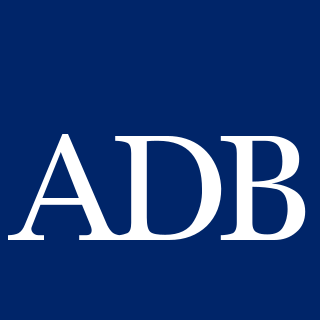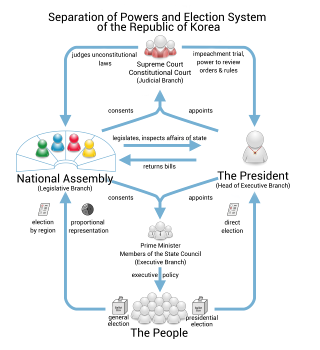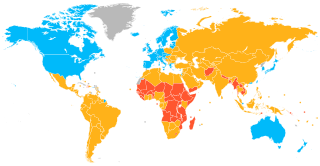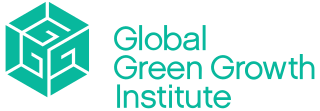Related Research Articles

The Asian Development Bank (ADB) is a regional development bank established on 19 December 1966, which is headquartered in the Ortigas Center located in the city of Mandaluyong, Metro Manila, Philippines. The bank also maintains 31 field offices around the world to promote social and economic development in Asia. The bank admits the members of the UN Economic and Social Commission for Asia and the Pacific, and non-regional developed countries. Staring with 31 members at its establishment, ADB now has 68 members.

The International Monetary Fund (IMF) is a major financial agency of the United Nations, and an international financial institution, headquartered in Washington, D.C., consisting of 190 countries. Its stated mission is "working to foster global monetary cooperation, secure financial stability, facilitate international trade, promote high employment and sustainable economic growth, and reduce poverty around the world." Formed in 1944, started on December 27, 1945, at the Bretton Woods Conference, primarily by the ideas of Harry Dexter White and John Maynard Keynes, it came into formal existence in 1945 with 29 member countries and the goal of reconstructing the international monetary system. It now plays a central role in the management of balance of payments difficulties and international financial crises. Countries contribute funds to a pool through a quota system, from which countries experiencing balance of payments problems can borrow money. As of 2016, the fund had SDR 477 billion. The IMF is regarded as the global lender of last resort.

The politics of South Korea take place in the framework of a presidential representative democratic republic, whereby the president is the head of state, and of a multi-party system. To ensure a separation of powers, the Republic of Korea Government is made up of three branches: legislative, executive, and judicial. The government exercises executive power and legislative power is vested in both the government and the National Assembly. The judiciary is independent of the executive and the legislature and comprises a Supreme Court, appellate courts, and a Constitutional Court.

The economy of South Korea is a highly developed mixed economy. By nominal GDP, ₩2.24 quadrillion, it has the 4th largest economy in Asia and the 12th largest in the world. South Korea is notable for its rapid economic development from an underdeveloped nation to a developed, high-income country in a few generations. This economic growth has been described as the Miracle on the Han River, which has allowed it to join OECD and the G-20. South Korea remains one of the fastest-growing developed countries in the world following the Great Recession and the COVID-19 recession. It is included in the group of Next Eleven countries as having the potential to play a dominant role in the global economy by the middle of the 21st century.

The economy of Yemen has significantly weakened since the breakout of the Yemeni Civil War and the humanitarian crisis, which has caused instability, escalating hostilities, and flooding in the region. At the time of unification, South Yemen and North Yemen had vastly different but equally struggling underdeveloped economic systems. Since unification, the economy has been forced to sustain the consequences of Yemen's support for Iraq during the 1990–91 Arab Gulf War: Saudi Arabia expelled almost 1 million Yemeni workers, and both Saudi Arabia and Kuwait significantly reduced economic aid to Yemen. The 1994 civil war further drained 8Yemen's economy. As a consequence, Yemen has relied heavily on aid from multilateral agencies to sustain its economy for the past 24 years. In return, it has pledged to implement significant economic reforms. In 1997 the International Monetary Fund (IMF) approved two programs to increase Yemen's credit significantly: the enhanced structural adjustment facility and the extended funding facility (EFF). In the ensuing years, Yemen's government attempted to implement recommended reforms: reducing the civil service payroll, eliminating diesel and other subsidies, lowering defense spending, introducing a general sales tax, and privatizing state-run industries. However, limited progress led the IMF to suspend funding between 1999 and 2001.
The International Bank for Reconstruction and Development (IBRD) is an international financial institution, established in 1944 and headquartered in Washington, D.C., United States, it is the lending arm of World Bank Group. The IBRD offers loans to middle-income developing countries.It is the first of five member institutions that compose the World Bank Group. The initial mission of the IBRD in 1944, was to finance the reconstruction of European nations devastated by World War II. The IBRD and its concessional lending arm, the International Development Association (IDA), are collectively known as the World Bank as they share the same leadership and staff.
The International Development Association (IDA) is an development finance institution which offers concessional loans and grants to the world's poorest developing countries. The IDA is a member of the World Bank Group and is headquartered in Washington, D.C. in the United States. It was established in 1960 to complement the existing International Bank for Reconstruction and Development by lending to developing countries which suffer from the lowest gross national income, from troubled creditworthiness, or from the lowest per capita income. Together, the International Development Association and International Bank for Reconstruction and Development are collectively generally known as the World Bank, as they follow the same executive leadership and operate with the same staff.

The economy of Uganda has a great potential and appears poised for rapid growth and development. Uganda is endowed with significant natural resources, including ample fertile land, regular rainfall, and mineral deposits.

A developed country, or high-income country, is a sovereign state that has a high quality of life, developed economy, and advanced technological infrastructure relative to other less industrialized nations. Most commonly, the criteria for evaluating the degree of economic development are the gross domestic product (GDP), gross national product (GNP), the per capita income, level of industrialization, amount of widespread infrastructure and general standard of living. Which criteria are to be used and which countries can be classified as being developed are subjects of debate. Different definitions of developed countries are provided by the International Monetary Fund and the World Bank; moreover, HDI ranking is used to reflect the composite index of life expectancy, education, and income per capita. Another commonly used measure of a developed country is the threshold of GDP (PPP) per capita of at least USD$22,000. In 2023, 37 countries fit all four criteria, while an additional 16 countries fit three out of four.

The Bank of Korea is the central bank of the Republic of Korea and issuer of Korean Republic won. It was established on 12 June 1950 in Seoul, South Korea.
Structural adjustment programs (SAPs) consist of loans provided by the International Monetary Fund (IMF) and the World Bank (WB) to countries that experience economic crises. Their stated purpose is to adjust the country's economic structure, improve international competitiveness, and restore its balance of payments.
An export credit agency or investment insurance agency is a private or quasi-governmental institution that acts as an intermediary between national governments and exporters to issue export insurance solutions and guarantees for financing. The financing can take the form of credits or credit insurance and guarantees or both, depending on the mandate the ECA has been given by its government. ECAs can also offer credit or cover on their own account. This does not differ from normal banking activities. Some agencies are government-sponsored, others private, and others a combination of the two.

The African Development Bank Group (AfDB) or Banque Africaine de Développement (BAD) is a multilateral development finance institution headquartered in Abidjan, Ivory Coast, since September 2014. The AfDB is a financial provider to African governments and private companies investing in the regional member countries (RMC).
An international financial institution (IFI) is a financial institution that has been established by more than one country, and hence is subject to international law. Its owners or shareholders are generally national governments, although other international institutions and other organizations occasionally figure as shareholders. The most prominent IFIs are creations of multiple nations, although some bilateral financial institutions exist and are technically IFIs. The best known IFIs were established after World War II to assist in the reconstruction of Europe and provide mechanisms for international cooperation in managing the global financial system.

The Infrastructure Consortium for Africa (ICA) was launched at the 2005 G8 Gleneagles Summit, with the mission to help improve the lives and economic well-being of African people by supporting and promoting increased infrastructure investment from both public and private sources.

The Global Green Growth Institute (GGGI) is an intergovernmental international development organization headquartered in Seoul, South Korea.

The Asian Infrastructure Investment Bank (AIIB) is a multilateral development bank and international financial institution that aims to collectively improve economic and social outcomes in Asia. It is the world's second largest multi-lateral development institution. Headquartered in Beijing, China, the bank currently has 106 members, including 14 prospective members from around the world. The breakdown of the 106 members by continents are as follows: 42 in Asia, 26 in Europe, 21 in Africa, 8 in Oceania, 8 in South America, and 1 in North America. The bank started operation after the agreement entered into force on 25 December 2015, after ratifications were received from 10 member states holding a total number of 50% of the initial subscriptions of the Authorized Capital Stock.
The Kampala–Jinja Expressway, also known as the Jinja–Kampala Expressway, is a proposed four-lane toll highway in Uganda, linking Kampala, the capital and largest city of Uganda, with the city of Jinja in the Eastern Region of Uganda.

The World Bank is an international financial institution that provides loans and grants to the governments of low- and middle-income countries for the purpose of pursuing capital projects. The World Bank is the collective name for the International Bank for Reconstruction and Development (IBRD) and International Development Association (IDA), two of five international organizations owned by the World Bank Group. It was established along with the International Monetary Fund at the 1944 Bretton Woods Conference. After a slow start, its first loan was to France in 1947. In the 1970s, it focused on loans to developing world countries, shifting away from that mission in the 1980s. For the last 30 years, it has included NGOs and environmental groups in its loan portfolio. Its loan strategy is influenced by the United Nations' Sustainable Development Goals, as well as environmental and social safeguards.
References
- ↑ Kapur, John Prior Lewis, and Richard Charles Webb, Devesh (1997). The World Bank: Perspectives . Brookings Institution Press. pp. 23. ISBN 0-8157-5236-9.
{{cite book}}: CS1 maint: multiple names: authors list (link)